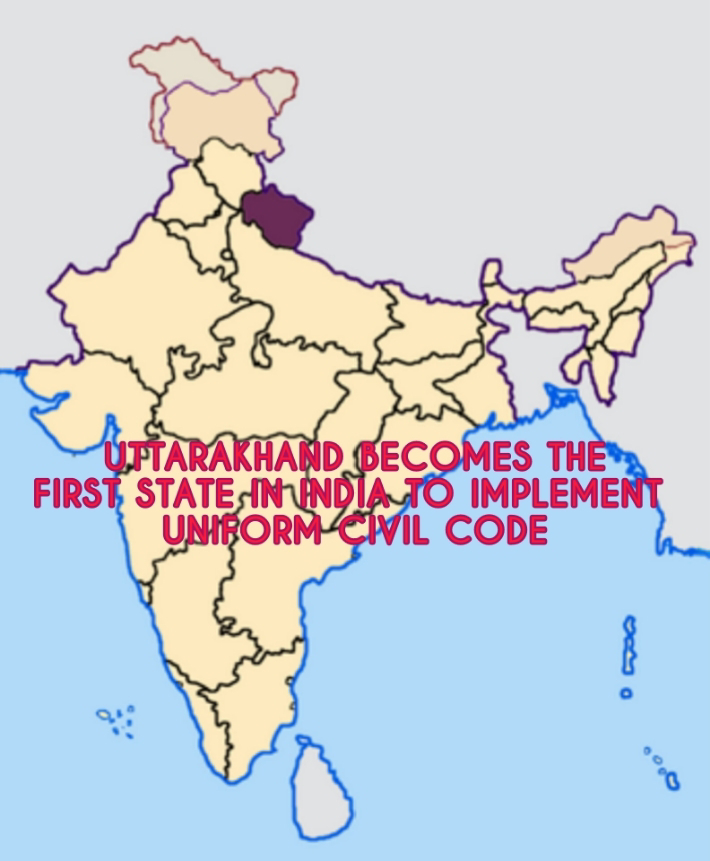Uttarakhand Implements Uniform Civil Code!
By Manu Shrivastava
Uttarakhand implemented the Uniform Civil Code (UCC) on February 6, 2024, after the state assembly passed the UCC Bill 2024. The bill was drafted by a committee of experts headed by retired Justice Ranjana Prakash Desai.
The UCC aims to establish a legal framework for uniform marriage, divorce, land, property, and inheritance laws, irrespective of religion⁶. The UCC also mandates the registration of live-in relationships and provides legal protection to children from such unions. The UCC has been hailed as a bold and progressive step by some, while others have criticised it as a violation of the fundamental rights and personal freedom of the citizens.
Uttarakhand's journey towards implementing the Uniform Civil Code (UCC) was intricate, facing hurdles across legal, social, political, and administrative domains. The complexities arose from reconciling diverse personal laws, constitutional guarantees of religious freedom, and cultural sensitivities. Opposition, both political and social, was fueled by concerns over religious identity and potential erosion of traditional practices.
Navigating through these challenges required meticulous administrative planning and logistical coordination to ensure effective dissemination of information and address practical implementation issues. Despite these hurdles, the successful implementation of the UCC heralded legal uniformity, promoting equality and reducing disparities in civil laws.
Moreover, the implications of UCC's implementation extended beyond legal uniformity. It marked a significant step towards gender justice, abolishing discriminatory provisions in personal laws and ensuring equal rights for women. Politically, Uttarakhand's adoption of UCC underscored the ruling party's commitment to its agenda, sparking national debates on the desirability of a uniform legal framework.
Socially, while concerns about cultural tensions existed, UCC aimed to foster social cohesion by promoting a sense of equality and inclusivity. Overall, Uttarakhand's journey towards UCC implementation reflected the complexities of balancing legal, social, and political dynamics, with implications spanning legal uniformity, gender justice, political discourse, and social cohesion.
The successful implementation of the Uniform Civil Code in Uttarakhand also highlighted the state's commitment to progressive reforms and its willingness to address longstanding issues related to personal laws and gender equality. By adopting UCC, Uttarakhand set a precedent for other states in India, signaling the potential for broader legal reforms aimed at promoting uniformity, equality, and justice.
However, the journey towards UCC implementation did not come without its share of challenges and controversies. Opposition from various quarters, including political rivals and certain religious and cultural groups, reflected the deeply entrenched societal divisions and differing interpretations of secularism and religious freedom. Addressing these concerns while upholding the principles of equality and justice required delicate negotiation and engagement with stakeholders across the spectrum.
Furthermore, the implications of Uttarakhand's adoption of UCC extended beyond its borders, influencing national discourse and setting the stage for broader conversations on legal reforms in India. The state's experience served as a case study for understanding the complexities and nuances involved in implementing uniform civil laws in a diverse and pluralistic society like India.
Uttarakhand's journey towards the successful implementation of the Uniform Civil Code exemplifies the intricate interplay of legal, social, political, and cultural factors in shaping policy decisions and reforms. While the path was marked by hurdles and controversies, the implications of UCC's adoption extend far beyond legal uniformity, encompassing issues of gender justice, religious freedom, political discourse, and societal cohesion.



























